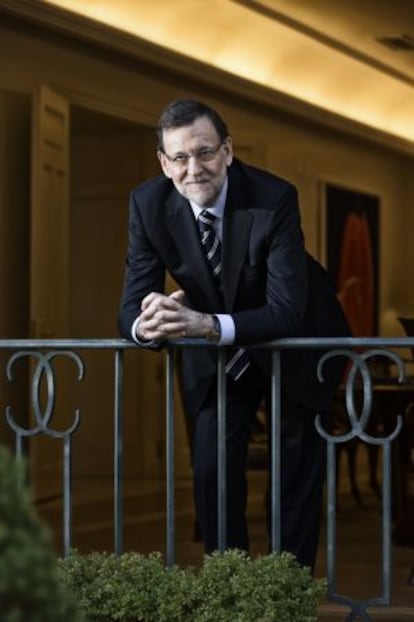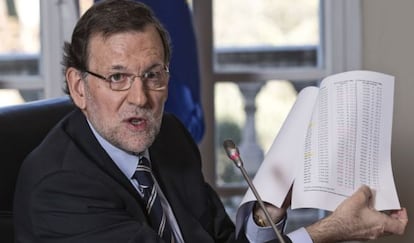“We have reformed Spain; now we need change at the EU level”
Prime Minister Mariano Rajoy speaks to journalists from EL PAÍS and five other newspapers The Spanish leader insists that the only solution to the crisis is job creation

A few days short of the second anniversary of his becoming prime minister, in an exclusive interview with a team of European newspapers including EL PAÍS, Mariano Rajoy insists that the five-year-long crisis has not resulted in greater inequality in Spain, and that the country’s ailing welfare state is able to cope with growing poverty. He insists that the only solution to the crisis is job creation, which will come as a result of labor market reforms.
Rajoy denies that Spanish politicians are impervious to the consequences of corruption. The prime minister also flatly denies the accusations against his Popular Party (PP) of illegal financing, as alleged in the ongoing investigation into former party treasurer Luis Bárcenas, who is now in jail. Rajoy also discusses the controversial razor wire on the Melilla border fence to deter migrants, but insists it will remain. He also tells Catalan premier Artur Mas that he would not approve a referendum on independence for the region, even if he could, saying that his hands are tied by the Constitution.
On Europe, the prime minister insists that “banking, fiscal, political and economic unity” are paramount for Spain and other countries bidding to escape the grip of recession.
Spanish leader’s date with Europe
The last five years, two of them under the government of Prime Minister Mariano Rajoy, have been among the most turbulent in Spain’s recent history: the financial crisis threatened the very future of the euro, and led this country to the brink of the abyss.
Rajoy has imposed a wide-ranging structural adjustment program, which in the opinion of many analysts has done more damage to the country’s social fabric than any good to the state’s spending structures. He has pushed through successive reform packages, all of them controversial. Now, finally, the money markets have calmed down, and the specter of bankruptcy has been exorcised, for the moment. This was the backdrop to Prime Minister Rajoy’s audience with a team of leading European journalists last Tuesday. Rajoy believes that Spain has done its homework, and that the tough months of adjustment are approaching their end.
He is now more concerned about Europe, and in particular about Germany, the only country in the EU, he suggests, that really knows where the bloc is headed. At the European Council's meeting on December 19, the major issues facing the Union will be under discussion. Rajoy's decision to grant an interview to our team of European journalists — his first with EL PAÍS since taking office — is clearly a way of trying to get his message over to the rest of Europe, and particularly Germany. This interview was published simultaneously by EL PAÍS and the other members of the Europa group of newspapers, The Guardian, Le Monde, La Stampa, Süddeutsche Zeitung and Gazeta Wyborcza, in their Monday print editions.
Question. Inequality has spread with the crisis. Are you worried that when the country emerges from the crisis, the country will be more unequal than ever?
Answer. There are no clear indicators in Spain or Europe about inequality, but one of the objectives of any government is equal opportunities for all and that people can live with dignity. We need employment to fight inequality. I do not believe that after the crisis and when the economy starts to recover, Spain or Europe will be more unequal. For those in difficulty there will always be the welfare state, and I think we need to defend the welfare state.
Q. So you don’t think that your government needs to address the issue of inequality?
A. No. For Spain to emerge from crisis doesn’t require any special mechanism: emerging from the crisis will come when more people have jobs.
Q. To what extent do you think that the austerity programs of the last five years are helping Spain emerge from crisis?
A. A large public deficit is not a good thing, and this is the message I want to send to the Spanish people. The deficit has made it difficult to access the international money markets. There are five things we need to do to get out of this crisis, and this is what I told the European Council: first, we need to reduce the deficit. Secondly, we need to implement structural reforms. We have reformed the financial system, introduced new education legislation and changed our labor laws; this is now a more flexible country, more competitive. The third thing we need are reforms at the European level. We have made progress with the internal market, but there is much to be done. Fourthly, we need more integration in Europe. This means banking union, tax union, political union, and greater economic union overall. Finally, we have to address the issue of lending and liquidity within the EU.
Q. Are you worried about next year’s European elections?
A. Yes, I am. In the first elections in 1979, 62 percent of the electorate voted. In 2009, the figure had fallen to 49 percent. People criticize Europe, but the EU has been very good for Spain. This country is now a democracy. We need to teach people how important Europe is for us. We also have to tell the world about our market of 500 million people, a market within which there are no barriers.
Q. Do you think that the coalition in Germany will reduce the pressure on the EU’s southern rim countries?
A. I do not think that much will change in terms of the perceived need for reducing the public deficit. The latest decisions on Spain, on France, on the Netherlands and some other countries taken by the European Commission will not allow any of us to change policy. Our deficit objective this year is 6.5 percent, but before it was 4.5 percent, and there was no way we could manage that. Next year it will be 5.8 percent, and from then on, it will fall. I am comfortable, because our focus is to increase revenue. Our problem isn’t so much spending, but tax collecting, and as we leave the recession behind, our revenue will increase. So there is no problem in that regard. Spain will continue to press ahead with structural reforms, because we believe the country needs them. What worries me most at the moment is Europe itself. Only Germany’s government is clear about where we are headed. But the worst is over for Europe, and now the task is growth and integration. That is where we need to focus our efforts, and I am convinced that the German government thinks the same, and will work in that direction.
Q. Some six billion euros have been set aside to combat youth joblessness, of which 1.8 billion euros corresponds to Spain. Is Europe doing enough to help young people find work?
I don’t think Spain is more unequal. There will always be the welfare state”
A. No, it isn’t, but what it is doing is better than nothing. Tackling youth unemployment isn’t about taking decisions here and there, or applying policies. All the structural changes that we have implemented will make a difference in the long run. We are going to tell the EU what we intend to do with that 1.8 billion. That money will be very useful, because we are going to use it in programs that are part of our strategy to generate youth employment.
Q. What kind of jobs do you intend to create?
A. One of the keys is low wages. In 2012, as soon as I took office, the unions and employers’ confederation agreed on keeping wages down. Public sector workers have had their salaries frozen for the last five years. This, along with changes to the labor market, has meant that companies in trouble have not had to fire people. A more flexible economy offers alternatives to laying people off. I want to see more temporary contracts. These can help people. On average, 20 percent of jobs are temporary contracts in the EU, in Spain the figure is only 14.6 percent.
Q. Are you thinking of getting rid of the minimum wage?
A. No, we are not going to get rid of the minimum wage.

Q. The bank bailout is approaching its final phase, but small businesses are still starved of loans, and no jobs are being created.
A. Spain’s banks needed 40 billion euros, although the maximum they were offered was 100 billion euros. It is good news that the program is coming to an end; it is also good news for Europe, because it shows that the EU’s mechanisms are working.
Q. And how much of that 40 billion euros can be recovered?
A. We will have to see. We still have a serious lack of liquidity. But loans are now making their way to small businesses and to the public, although there is still no money for homebuyers. But this was a country where too much credit was made available, and then too little. I hope that the restructuring of the banks throughout Europe will help free up more liquidity. We are also beginning to see an increase in exports.
Q. But the export sector doesn’t create jobs.
The deficit will fall. I am comfortable, because our focus is to increase revenue”
A. Yes it does. I mean that we mainly export machinery, as well as chemicals, foodstuffs and cars, and all these create jobs. Consumer spending also creates jobs, and so does tourism, and we have many more service exports than just tourism. A year ago I could not talk of hope, and now I can.
Q. The government has just approved new laws giving the police extensive powers to quell protests, as well as imposing heavy fines on certain types of protest. These are the kind of laws we normally associate with countries such as Russia. How can you justify a law that sanctions people for insulting Spain?
A. The right to freedom of expression, to protest and to gather is a constitutional right. These new laws are a response to changes in the penal code, as well as in support of shopkeepers and the public to put an end to certain types of behavior that are problematic. If any of these laws prove unreasonable, then we have the means to change them.
Q. Let’s turn to your government’s decision to place razor wire atop the fences in Melilla, one of Spain’s two North African exclaves. Migrants trying to cross the frontier say that they will not be dissuaded by the wire, despite the physical harm it inflicts.

A. The razor wire is there to put people off, and has been there since 2005.
Q. But it doesn’t deter anybody.
A. I think that it does, and we must remember that razor wire is used in many countries, in many institutions, and in many places. If we could find an effective alternative, we would remove it.
Q. There is a serious problem with Catalonia. How do you plan to address the sovereignty drive?
A. Catalonia is one of the most important issues at the moment, and everybody in this country knows my position. Spain is the oldest nation in Europe. Spain and Catalonia have never been separate. As head of the government I have certain obligations that I must fulfill. I cannot allow Catalonia to hold a referendum. I cannot approve a referendum, as is going to happen in Scotland, for the simple reason that the Constitution does not allow me to do so. The Constitution would need to be changed first. Scotland and Catalonia are very different. The United Kingdom has no written constitution. But we should bear in mind that any part of a country within the EU that leaves that country also leaves the EU.
Q. What about the crisis affecting the monarchy?
A flexible economy offers alternatives to firing. I want more temporary contracts”
A. This thing about the “crisis of the monarchy” implies a value judgment about the monarchy. I think having a monarch as head of state makes a lot of sense. I think that it enjoys widespread support, and has contributed a lot to Spain, and has guaranteed the country’s stability. So therefore, what we all have to do is to support the monarchy and preserve it. That is my position.
Q. And abortion. Do you think that your government has sufficient legitimacy to change the law on terminating pregnancies?
A. Legitimacy in this case comes from the fact that the reform was already part of the PP’s electoral program before we took office.
Q. This is true, but the general feeling is that your party was voted into office to get Spain out of the crisis, and the opinion polls show that a great many people are opposed to the abortion law changes you are proposing.
A. Once again, we are talking about opinions, all of them perfectly respectable, but the fact of the matter is that abortion reform was part of the Popular Party’s electoral program.
Q. Gibraltar was once rarely in the headlines, but now it seems to be in the newspapers every day. Why do you think that is, and what can the UK expect from Spain in this regard?
A. Relations between Spain and the United Kingdom, and mine with David Cameron, are very good. Spain’s position is based on international law. This is a subject that the United Nations has discussed at length, saying that Spain and Britain must begin negotiating on decolonization based on criteria established by the United Kingdom. That is one aspect of the issue, but the discussion at the moment is about decisions that the authorities in Gibraltar have made that affect other issues related to the environment and taxes. We are not talking about sovereignty here, but simply the EU’s rules, which we and the United Kingdom have to obey. There is another issue, which is tobacco smuggling: this is a serious problem on a large scale. Then there is the matter of the myriad companies registered in Gibraltar, about which we know nothing, despite the fact that they operate within the EU. These issues need to be resolved, and resolved intelligently and to the satisfaction of all the parties involved.
Q. Finally, how do you intend to reduce taxes without reducing the amount of money the government collects?
A. By increasing economic activity. We were not in a position to do this until now, but now I believe that we are able to. The main objective of lowering taxes, legislation that we will pass next year, is to reduce the burden on families, so this will mainly be about income tax and helping small businesses.
“All the corrupt officials resigned”
Question. The Spanish electorate is deeply concerned about corruption in this country. Transparency International has recently published data that puts Spain in the same league as Libya, Mali and Guinea Bissau. What strategies do you have in place to tackle graft?
Answer. This is a problem, without doubt. There may be cases of corruption, but the vast majority of politicians are honest and decent. We should not help to spread the idea that corruption is widespread in this country when this isn't the case. We are also working to introduce new legislation on party funding, as well as a transparency law. I am not happy about corruption and my government is doing everything possible to tackle it.
Q. Why do politicians never resign even when there is so much evidence against them? How would you assess Spain's reputation in this regard internationally?
A. Everybody involved in the corruption cases that have made the headlines has resigned. I do not know of any public office holder who is being investigated by the courts at this moment. Here in Madrid, all those involved in the Gürtel case have resigned, as has the Popular Party's former treasurer.
Q. But there is a huge difference between what you say and what most people think. And abroad, it is the same: everybody wants to discuss corruption in Spain. Do you have any responsibility for this?
A. I have discussed this in Congress, and I have put forward measures to tackle corruption; more are on the way. You may have your opinion, but you have to remember that other people have theirs. We in the PP know what has happened, who those involved are, and anybody implicated in corruption is no longer in the party, and we are going to do everything to prevent anything like this from happening in the future.
Tu suscripción se está usando en otro dispositivo
¿Quieres añadir otro usuario a tu suscripción?
Si continúas leyendo en este dispositivo, no se podrá leer en el otro.
FlechaTu suscripción se está usando en otro dispositivo y solo puedes acceder a EL PAÍS desde un dispositivo a la vez.
Si quieres compartir tu cuenta, cambia tu suscripción a la modalidad Premium, así podrás añadir otro usuario. Cada uno accederá con su propia cuenta de email, lo que os permitirá personalizar vuestra experiencia en EL PAÍS.
¿Tienes una suscripción de empresa? Accede aquí para contratar más cuentas.
En el caso de no saber quién está usando tu cuenta, te recomendamos cambiar tu contraseña aquí.
Si decides continuar compartiendo tu cuenta, este mensaje se mostrará en tu dispositivo y en el de la otra persona que está usando tu cuenta de forma indefinida, afectando a tu experiencia de lectura. Puedes consultar aquí los términos y condiciones de la suscripción digital.








































